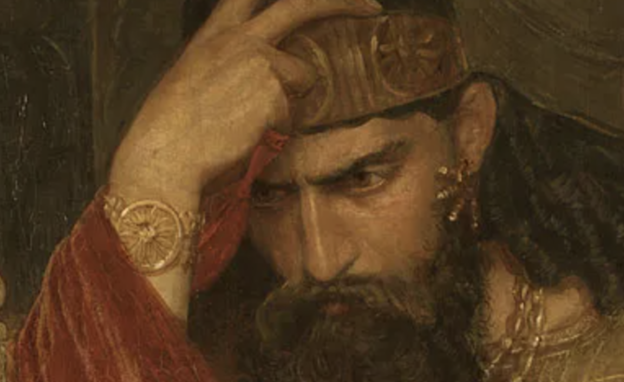One of the Shakespearean plays I studied at school was King Lear, which is a tragedy of a king who divided his kingdom between two of his daughters, and then loses everything because of their mistreatment of him. Ironically, his fool is wise while the king is a fool. King Lear ends up dying, grieved and stripped of everything.
This play came to mind because this passage focuses on foolish King Saul and his foolish actions, this time in making foolish vows. Ironically, his son who will be denied the kingship because of Saul’s past acts is a better example of a king than Saul is. In the end Saul’s foolish acts and pseudo-religious cloaking of his actions place him off-side with God, and his credibility with his people undermined. This reminds us that repentance for sin is more important than outward religious practice.
In the previous verses we saw how God saved Israel through the faith of Saul’s son, Jonathan, who trusted God to use him if God wished. While verse 23 ended on a high note, verse 24 begins with a low note – God’s people were hard pressed. In a pseudo-religious attempt to improve things, Saul placed a curse on any troops who ate before dinner (v.24). He made it worse.
Sure enough, Saul’s hungry troops came across a forest brimming with honey, and had to struggle their way through (vv.25-6) which eventually led to physical and military exhaustion (v.31).
Unlike the soldiers of Saul who heard his foolish oath, Jonathan enjoyed the refreshment that fresh honey brings (vv.27-8). When the soldiers near him advised Jonathan of Saul’s oath, Jonathan wisely noted how Saul’s actions had “troubled the land” because it made things harder for the troops to fight on an empty stomach and reduced the defeat the Philistines suffered (vv.29-30). Saul asked more than God required.
Because of Saul’s foolishness, the troops were famished. As a result, they fell on the spoils of their victory, and killed the cattle and sheep for food which they ate without draining the blood (v.32). This was a violation of the Law, which banned consuming blood since it represented the life of a being (Lev. 17:10-14).
Sensing a chance to display religious piety, Saul sprang into action, scolding the Israelites and demanding they kill them properly (vv.33-4). Then he made an altar with (presumably) the rock which he provided them to use (v.35).
Thinking things were now sweet with God, Saul questionably suggested attacking the Philistines by night to gain more plunder (v.36). As if exhaustion and plunder had led to good results so far. After a half-hearted response, a priest suggested checking with God (v.36). But God refused to speak to Saul, showing the religious spectacle was just pomp and ceremony (v.37).
The scene was set for another foolish oath. Saul presumed the problem was sinners in the camp, so vowed to kill them, even if it was his son Jonathan (vv.38-9). The people were speechless. For some reason, he separated himself and Jonathan from the rest of Israel, only to find the lots fell on them, not Israel (vv.40-41). Then it fell on Jonathan, hero of the hour! (v.42). Jonathan straightforwardly acknowledged his acts, and Saul threatened to kill him right then (vv.43-4).
Ultimately the lots were one of God’s ways of communicating, but this does not mean that God wanted Jonathan killed. After all, Jonathan in this chapter is the ideal Saul fails to live up to. Rather, we should perhaps see this as God’s judgement on Saul for his outward religious show. Really, he was to blame. But the lots fell on the wise and faithful son. It showed Saul as the wrongdoer because of his rash vow, now poised to kill his faithful son.
But the people intervened, sparing Jonathan, and wrecking Saul’s credibility completely (v.45). Everyone went home. The Philistines did too, instead of being utterly destroyed, because of a foolish king (v.46).
This passage shows us clearly the folly of outward religious acts when your heart is not repentant. While Saul’s every act seemed pious, it put unbiblical burdens on God’s people, tempted them into sin, and made his faithful son an unintentional oathbreaker.
What God wants from us is not outward acts, but inward repentance that leads to faithful following and deeds.
Note also in this chapter that Jonathan looks more like kingly material than his father. Yet he would never inherit because of Saul’s folly and God’s judgement on his house. While this offends our modern self-actualising instincts, Jonathan does not seem worried like we are.
Perhaps we should focus less on our own self-advancement and more on serving God with our gifts, even if we never reach the lofty earthly heights the world says we should aim for.
True wisdom is not found in religious playacting, but in fearing God, repenting of our sins, and moving forward in faith and the forgiveness that comes to us through Christ’s atoning death on the Cross.

